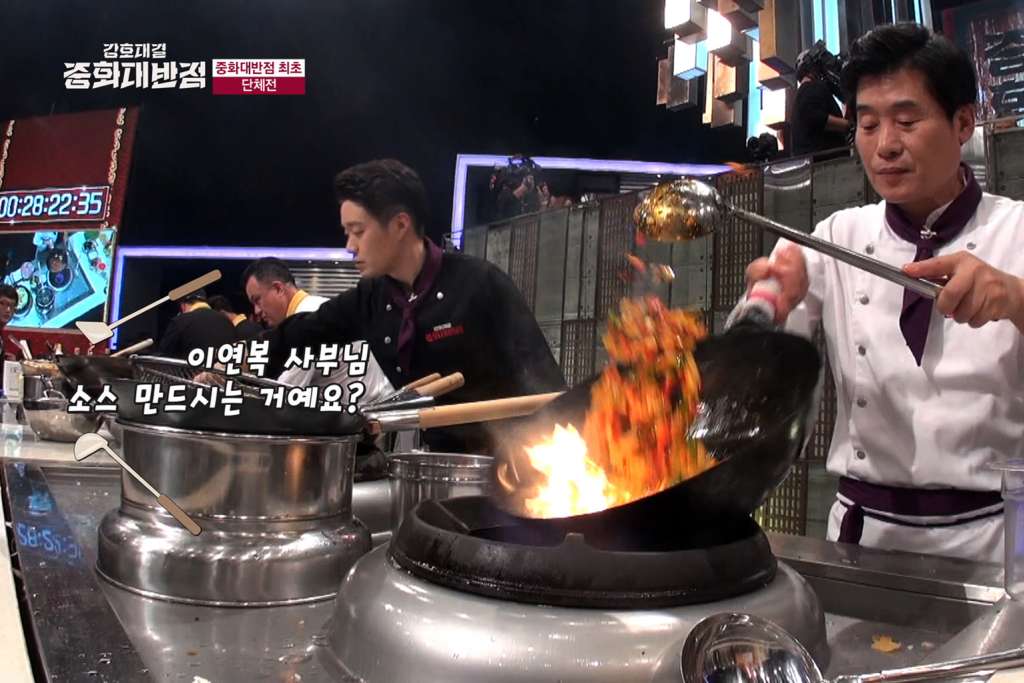On stage at food festival Taste Busan in South Korea, facing a crowd of more than 100 adoring fans, Choi Hyun Seok sings a song and plays the guitar.
Later, he signs autographs and has his picture taken with fans who have formed a snaking queue in front of a food stall in order to meet their idol.
Occasionally, the photogenic star fiddles with his floppy fringe, making sure he looks photo-ready.
Choi may be mistaken for a K-pop star, but he is actually a TV chef with a huge following, and one of the most recognisable faces in the cooking show boom that has overtaken South Korea in the past two years.
Korean TV is obsessed with food at the moment and loyal female viewers with the shows’ famous chef-hosts.
Dominating the airwaves in South Korea and regionally are shows with an ingenious combination of foodie culture and celebrity challenges.
Top-rated programmes include Please Take Care Of My Refrigerator, a weekly programme where chefs are tasked to rustle up a meal using ingredients from celebrities’ fridges – a winning formula that combines idol voyeurism and mouthwatering recipes.
Idols whose fridges have been raided include rapper G-Dragon, rookie girl group Twice and actor Lee Jae Hoon.
Then there are the shows that appeal to viewers because they get to see celebrities doing something “normal” – such as whipping up a meal.
In Three Meals A Day, K-pop idol Ok Taecyeon and actor Lee Seo Jin are sent to a village to cook, well, three meals a day.
Home Food Rescue features another celebrity chef, Paik Jong Won, teaching four clueless celebrities – comedian Jang Dong Min, singer Jung Joon Young and actors Kim Guk Jin and Lee Jong Hyuk – how to cook in the second season.
Paik also has his own programme, Go Go With Mr Paik, where he whips up local delicacies while travelling through South-east Asia.
The popularity of such cooking shows has spread beyond Korean shores.
In Singapore, Korean cable channel tvN Asia reports that cooking travelogue Go Go With Mr Paik and cooking contest Masterchef Korea 4 earned the highest ratings out of 45 programmes aired here in the third quarter of this year.
Last year, Sony’s Korean entertainment channel One expanded its offerings beyond K-drama and K-pop programmes to include K-cooking shows.
It added famed chef Paik’s cook-off show Nation’s Big Three last year, and recently premiered Chinese cuisine show The Great Chinese Food Battle last month.
Streaming service Viu’s Korean catalogue includes cooking reality show Three Meals A Day and My Little Television, which features a cooking lesson segment that launched the TV career of chef Paik.
The proliferation of K-cooking shows are a natural continuation of the Korean wave, which has largely been driven by K-dramas and K-pop, says Ms Virginia Lim, senior vice-president and head of content, production and marketing, and networks for Asia at Sony Pictures Television.
She adds: “The love of Korean food, culture and lifestyle has spread through the popularity of South Korean dramas and entertainment shows.”
Singaporean viewer Candy Tan, 25, agrees.
“I wouldn’t have known about K-cooking shows if I didn’t watch Korean variety shows,” the advertising account executive says.
She watched Three Meals A Day because it was produced by Na Young Seok, who is the same person behind variety shows such as the popular celebrity travelogue programmes Grandpa Over Flowers and Youth Over Flowers.
For another viewer, hotel sales director Cynthia Koh, 49, watching actors eat Korean dishes in K-dramas got her into K-cooking shows.
“Every Korean drama will feature food – be it breakfast, lunch or dinner. The food looks really appetising. Watching the actors eat it, I felt that I could actually taste it.”
She would satisfy her cravings by going to the Korean restaurant near her workplace for lunch.
But now she also turns to cooking shows such as Home Food Rescue.
She says: “In Home Food Rescue, the cooking methods are explained simply and clearly by chef Paik, who injects plenty of humour along the way.
“Watching celebrities learn how to cook is hilarious and relatable.”
“Relatable” is the key word differentiating the new generation of cooking shows from their predecessors.
In the past, such programmes typically had viewers in awe of the professionals’ fancy cooking techniques, says Korean cable channel tvN producer Paek Seung Lyong.
Now, the emphasis is on recipes that are simple and easy-to-follow.
Citing the amiable cooking guru Paik, he says: “Chef Paik gives confidence to beginners to try out his simple cooking methods.
“People posted their homemade dishes on social media and the recipes got popular.”
In fact, Ms Tan was inspired to make kimchi and tuna stew after watching actors prepare the dish on Three Meals A Day in a fishing village.
She says: “I usually don’t eat tuna because of its fishy smell, but I saw an episode where the stew made by the cast looked so good, I went and tried it out myself.
“Surprisingly, the flavours of tuna and kimchi go well together.”
Perhaps the appeal of K-cooking shows simply lies in the universal language of food.
Korean chef Lee Yeon Bok, 57, who makes regular TV appearances in South Korea, says: “Though not everyone cooks, everyone shares a love of eating.
“The appeal of a cooking show lies in watching all the ingredients coming together to form a beautiful plate of food. It’s irresistible.”
Lee Yeon Bok
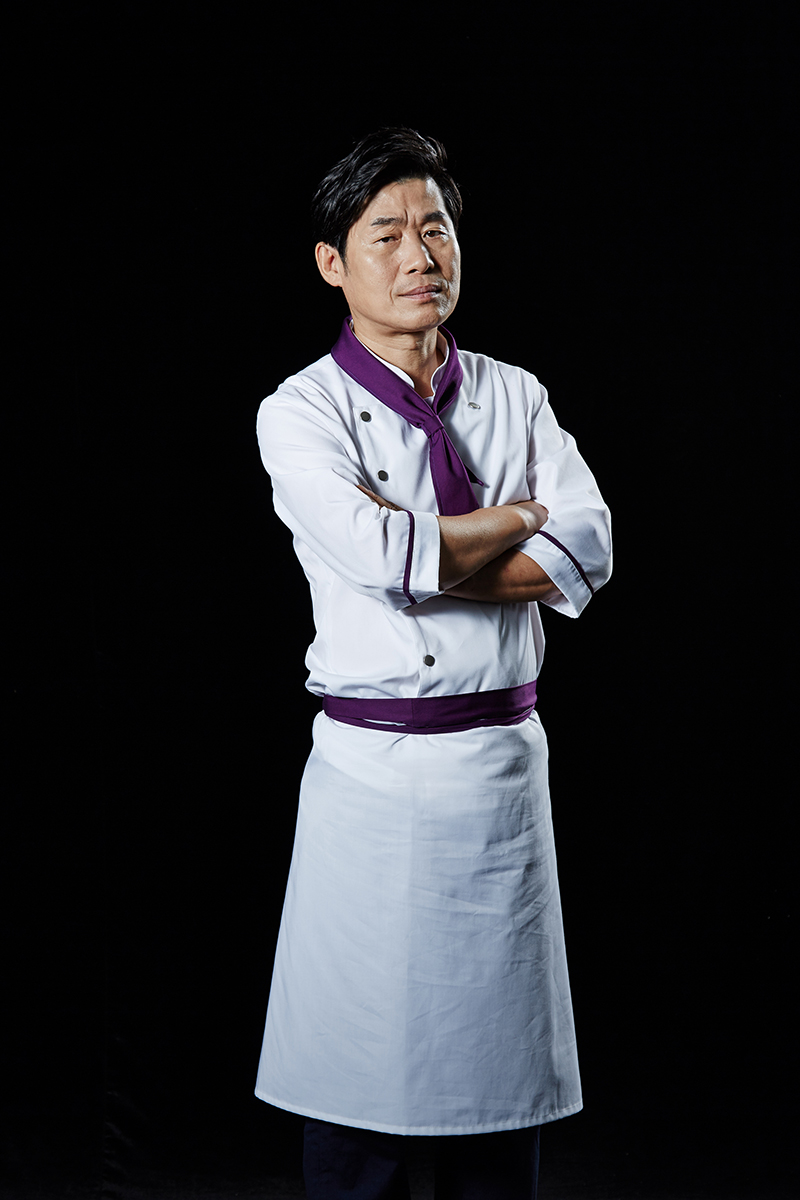
Fans of Korean chef Lee Yeon Bok are known to go up to him on the streets and say: “Can you take care of my fridge too?”
The question is a reference to Please Take Care Of My Refrigerator, a popular cooking show in which he and other chefs raid celebrities’ refrigerators and then use the ingredients found inside to whip up dishes in 15 minutes.
As one of the regulars on the hit TV programme since 2014, the 57-year-old Lee, who specialises in Chinese cuisine, is now a household name in South Korea.
He makes regular appearances on other shows, too, such as The Great Chinese Food Battle, where chefs are pitted against one another in a Chinese cuisine cook-off.
His soft-spoken demeanour belies the creativity of his fusion dishes, such as the fried sirloin beef drizzled with spicy sweet and sour sauce, which impressed the guests in the first episode.
His TV appearances have translated to a great following off-screen, too. His Chinese restaurant Mokran in Seoul, which he has been running since 1998, is often fully booked and attracts a star-studded clientele such as the members of the supergroup BigBang and Yoona of girl group Girls’ Generation.
In an e-mail interview with The Straits Times, he says things can get “awkward” when he is approached while he is talking to his chefs in the restaurant or while he is out shopping and carrying bags of ingredients.
“I’m not used to the attention, but I understand that being on TV means becoming a public personality.”
His TV ambitions remain rooted in his passion for food.
“I am on TV because I love what I do and I am able to share that joy and my interest with everyone out there.”
His love affair with Chinese cuisine began in his teens when he worked as a delivery boy for a Chinese restaurant.
He says: “There was so much going on in the kitchen – the fiery wok, live seafood in the tank, the endless chatter and laughs. It was just fascinating.”
He went on to work at a Chinese restaurant in a hotel at age 17 and then moved on at 22 to become a chef at the Taiwanese embassy in South Korea.
Even with his numerous TV appearances, he insists that his day job comes first.
For example, he still spends his daily lunch breaks wrapping 400 dumplings at Mokran.
He says: “A lot of young chefs find that it is hard work to make dumplings. Wrapping dumplings reminds me not to take the easy way out and never to take things in life for granted.”
The Great Chinese Food Battle airs on Mondays at 8pm on One (StarHub TV Channels 124, 820 and 823; Singtel TV Channels 513 and 604)
Paik Jong Won
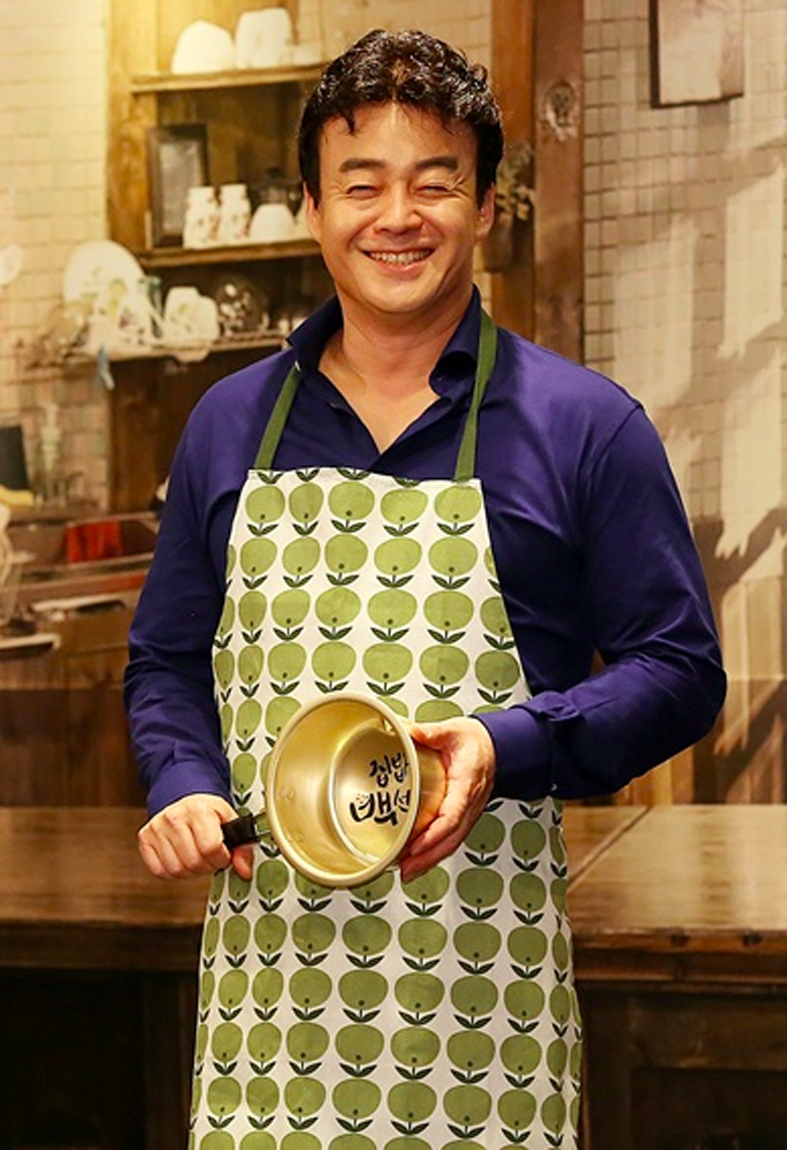
He is the Jamie Oliver of the Korean culinary world.
Like the British chef-restaurateur, Paik Jong Won has multiple TV shows and runs a food and beverage empire with 28 brands and hundreds of outlets in Asia and the United States.
Singaporeans may be familiar with his eateries here, which include BBQ restaurant Bornga, Korean express food outlet Paik’s Bibimbap and cafe chain Paik’s Coffee.
What’s the secret to his success?
Imperfection, he says.
Speaking through a translator, the 50-year-old tells The Straits Times that his first TV appearance was on My Little Television, a live cooking show.
“Chefs usually don’t like to do live television because their mistakes will be broadcast. I took it as a challenge.
“I think people took to me because I made mistakes while cooking. It gave them confidence to learn how to cook.”
My Little Television is a live Internet show comprising individual segments helmed by celebrity guests vying to attract the highest viewership for each episode.
Last year, Paik’s cooking demonstration overtook other programmes such as a mixed martial arts match and fashion makeover segment to be the reigning ratings champion.
One of the reasons for his popularity was his, well, imperfection.
Once he added too much sugar while making steamed buns, and then told the viewers: “You can just dip the bun in less syrup when you eat it later.”
Another time he was splattered by oil while stir-frying congealed blocks of leftover jajangmyeon or black bean paste noodles.
Mistakes aside, audiences love him for his deep knowledge of ingredients and cooking techniques.
So popular is he that he anchors three other shows on his own: Cooking 101 show Home Food Rescue, foodie programme The Nation’s Big Three and cooking travelogue Go Go With Mr Paik.
He was in town earlier this week with K-pop idols Onew and Jung Chae Yeon to film the Singapore episodes of Go Go With Mr Paik.
He whipped up the Singapore delights of laksa and chicken rice using ingredients purchased from markets in Little India and Chinatown.
His lack of formal culinary training, to him, is an advantage.
Paik, who was a trader in building materials before establishing his food business The Born Korea in 1993, says: “I didn’t get tied down to following specific know-how or sticking strictly to recipes. I try to remember the taste of the dish and recreate it in a simple and easy manner.
As a businessman, he is a stickler for detail, though, travelling to Singapore twice a year to check on his franchise outlets.
“Customers are discerning. Even if audiences visit my restaurants because of my shows, the quality of the food and drinks must be good for them to make repeat visits.”
Food is not merely his means of living, it is his life.
Even on days off, the family man enjoys preparing meals for his family of three – actress So Yoo Jin, 35, and their two-year-old son and one-year-old daughter.
The meal duties are split 60-40 with his wife, with the doting husband taking on the majority because his wife is busy filming dramas.
He says: “I feel really fortunate to be able to cook for the people I love. I feel rejuvenated seeing the happy faces of people when they tuck into the meals I have prepared for them.”
Go Go With Paik in Singapore airs on Dec 19 and 26 at 10.30pm on tvN (Singtel TV Channels 518 and 619 and StarHub TV Channel 824 )
My Little Television series is available on viu.com and the Viu app, which can be downloaded from the Apple App Store and Google Play Store.
Food shows to savour
PLEASE TAKE CARE OF MY REFRIGERATOR
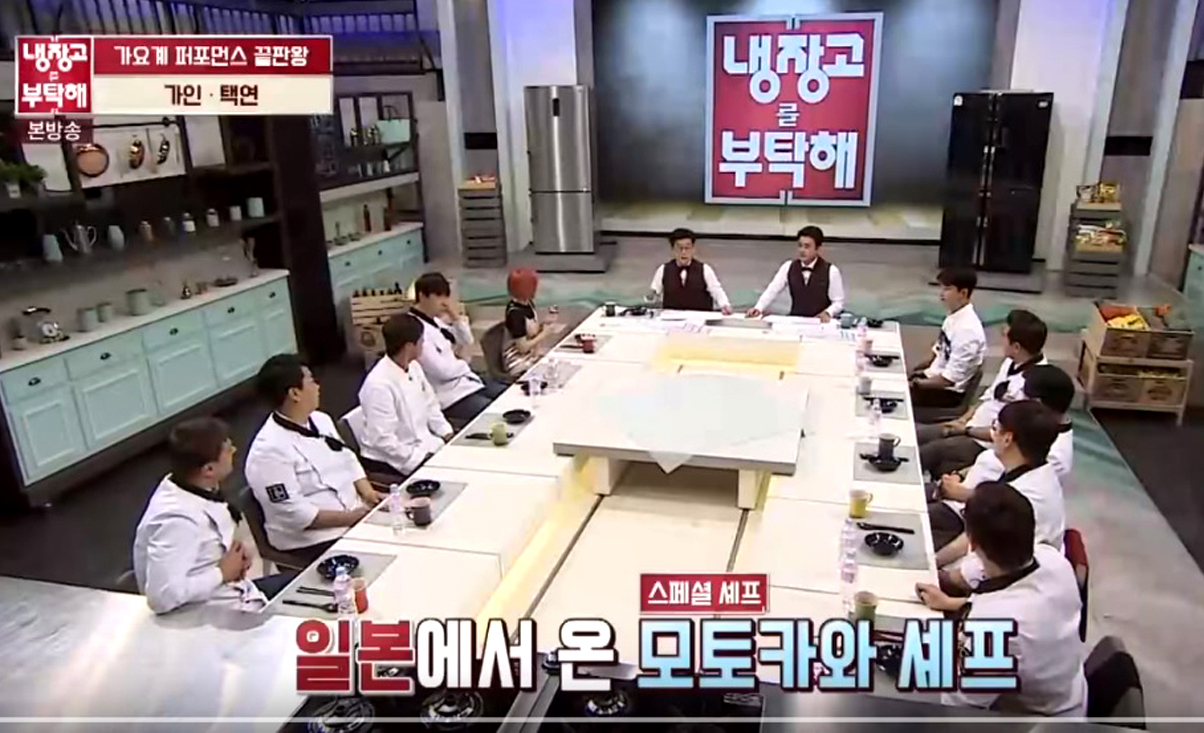
Started in 2014, this programme features chefs competing against one another to cook the best meal using ingredients found in the refrigerator of a featured celebrity. Yes, the show is a 15-minute cooking contest, but it is also an excuse to peek into the private lives of stars.
For example, members of boyband GOT7 share a fridge with a huge supply of ice cream and with each member scribbling his name on his personal tub.
BigBang member Taeyang is revealed to be a Korean food fanatic, too, with his fridge stocked with kimchi and spicy pepper powder.
Watch: Video clips of the show are available on JTBC Entertainment’s YouTube channel.
THREE MEALS A DAY
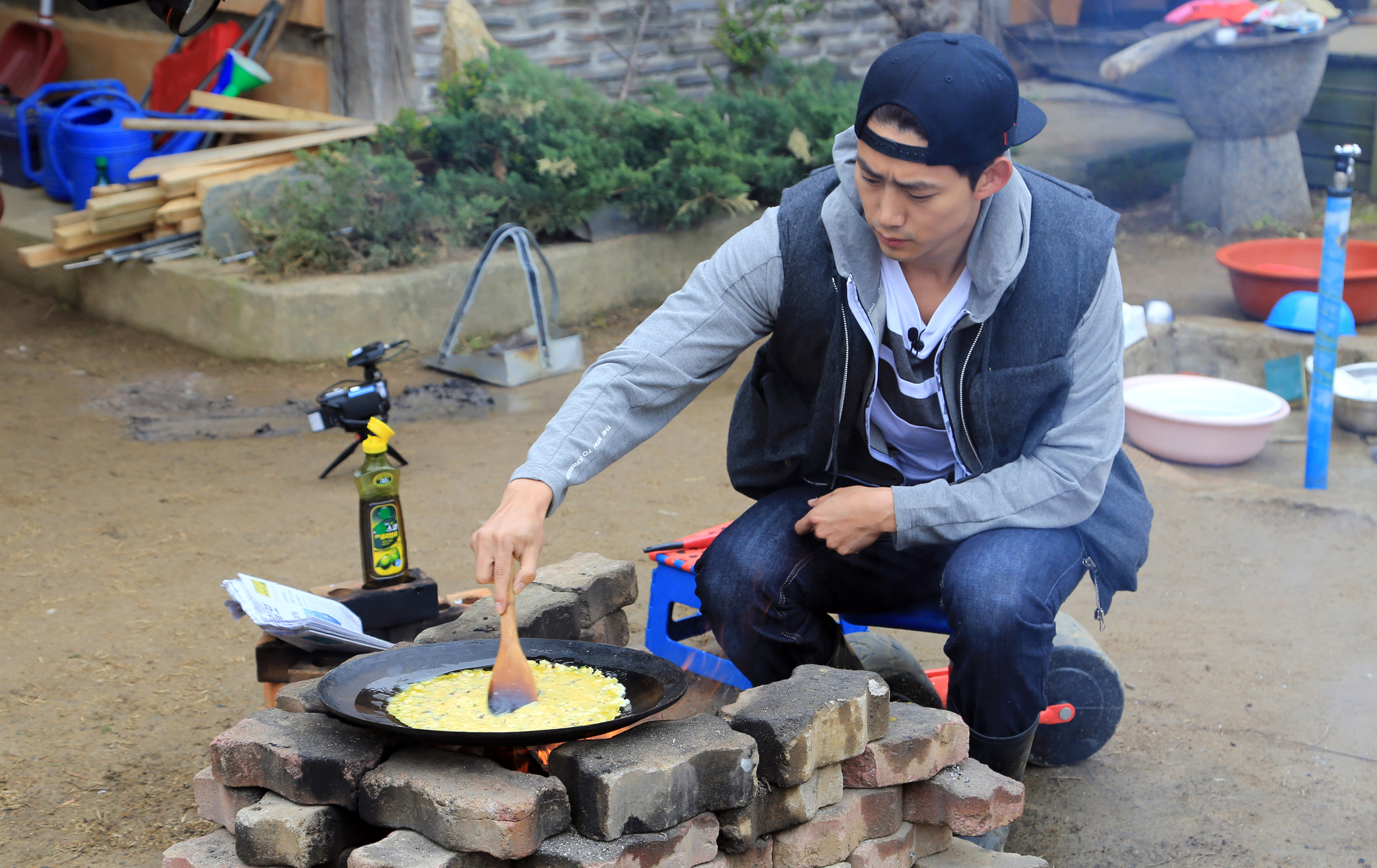
Each season, a celebrity cast is sent packing to either a rural village or a remote island, where he has to cook three meals a day from scratch.
The city slickers have to get used to a more primitive way of life, which in volves chopping firewood, cooking over a wood fire, harvesting crops or fishing.
The first season in 2014, starring the grumpy actor Lee Seo Jin and the ever-optimistic K-pop hunk Taecyeon (above), was a huge hit.
Since then, various other line-ups have been featured. The show is now in its sixth season, featuring Lee, actor Yoon Kyun Sang and Eric Mun of boyband Shinhwa.
Watch: Three Meals a Day – Fishing Village 3 airs on tvN on Saturdays at 9pm. The first season is available on Viu.
HOME FOOD RESCUE
In this weekly show, chef Paik Jong Won runs a cooking class for four clueless guys.
In the show’s second season, the students are singer Jung Joon Young, comedian Jang Dong Min,and actors Kim Guk Jin and Lee Jong Hyuk.
Paik has a simple, step-by-step approach to cooking. In an episode on cubed radish kimchi, he had to teach his bumbling students how to wash a radish thoroughly.
Watch: Home Food Rescue 2 airs on tvN on Fridays at 11pm.
THE NATION’S BIG THREE
In this programme, Chef Paik Jong Won goes around South Korea sussing out the best restaurants and eateries, and then invites the cooks to the TV studio to whip up dishes for celebrity guests.
Watch: The series is available on Viu and airs on channel One on Wednesdays at 11pm.

This article was first published on Nov 05, 2016.
Get a copy of The Straits Times or go to straitstimes.com for more stories.
